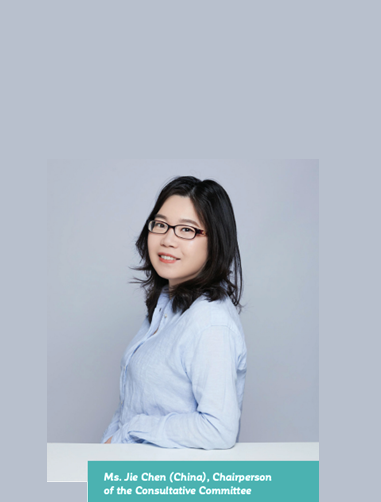Concerted effort of the CFC Consultative Committee to address development challenges
Ms. Jie Chen is currently serving as Chairperson of the Consultative Committee (CC) for the CFC. She works with the Chinese Academy of Forestry and has vast experience in forest product trade, sustainable supply chain of timber and certification/verification. Based on her research and practical work, she has been actively providing support to policy decision makings and offering technical support to timber companies for legal and sustainable forest products trade.
 What is your experience working with commodities?
What is your experience working with commodities?
Together with my colleagues, I have been working on the commodity of timber, especially timber value chain and forest certification/ verification. The experience in the timber supply chain between China, Africa and the Association of Southeast Asian Nations allowed me to gain good understandings of tropical timber production and trade. To ensure a legal and transparent timber supply chain, I helped to develop a due diligence verification system that adapts to the timber supply chain in China as well as the legal timber procurement guidelines. I also work with timber companies and associations in China to promote the use of these tools for better supply chain management and ensure that companies have the capacity to meet the national and international legislative requirements on timber legality. I think my experience in the green and legal timber supply chain is significant, especially in encouraging timber companies to pay more attention to local livelihood and environment conservation in the host countries during timber trading.
How does this experience relate to the CFC?
The CFC emphasises development impacts, especially in the least developed regions. Although the CFC currently receives few projects on forestry and timber, my experience in timber supply chains enables me to understand problems in the supply chain for agriculture and other products, and understand what the smallholders in Asia, Africa and Latin America need for achieving better practices and moving toward sustainable, environmentally friendly and responsible commodity production. Moreover, my experience could give the CC a different angle to review projects through, and my connections with timber and agroforestry companies make me well placed to share the call for such projects with a wider field of potential applicants. I believe that many more people and projects could get to know the CFC and benefit from this source of funding.
What is the importance of the CC for the CFC’s operations?
The CFC is a development fund for commodities, with a special emphasis on small producers and their economic benefits from supply chain. How to make sure that the CFC’s funding reaches the right projects, the right people and the right countries is the main responsibility of the CC. It evaluates the submitted projects based on their economic viability, managerial capacity, and social, environmental, and innovative impact. To achieve fair and equitable project assessments and recommend the right projects to the Executive Board (EB), the CC is composed of representatives with different backgrounds from 9 countries, providing good insights and rich, diversified experiences on commodities. Every year, the CC members have two meetings to review the projects submitted, using their knowledge, expertise and experience to ensure that the CFC’s current financial resources can be responsibly used to achieve the CFC’s aim of developing commodities for the benefit of everyone in the supply chain. The CC’s review of projects helps the CFC to avoid social, environment and economic risks and brings new concepts and ideas to future project screening. All in all, the CC’s work is important, providing essential support to the EB’s decision making.
How has the CC been operating and assessing projects during the COVID-19?
COVID-19 was an unexpected interruption to everyone’s life, but the CC continued operating normally under the support of the Secretariat. The CC’s work did not stop because of the pandemic; in fact, it has become even more crucial, as emergency funding needs to be allocated for economic recovery, especially in developing countries, which are the CFC’s main concern. In this context, the CC held virtual meetings to assess projects, following our usual procedures. The CC also uses the intersessional mechanism to assess and approve emergency projects via email. So far, all the members are pleased with our contribution and support to the CFC’s quick efforts to aid post-pandemic recovery.
What is you experience with virtual meetings?
Overall, my experiences with virtual meetings have been good. They give us many conveniences: there is no need for visas, long travel times, jet lag, etc. It is time-saving for members who are busy with office work. Of course, working virtually also brings some inconveniences. It is sometimes hard for the CC members to be 100% focused on the discussions while still dealing with their office work. For members from Asia and Latin America, virtual meetings mean a much longer workday – I have worked 16 hours on meeting days! Virtual meetings often don’t allow for CC members to have in-depth communications, and there are four new members who we haven’t met in person until now. I think virtual meetings can be used in the future to complement in-person meetings (which I still prefer) to ensure good discussion and communication.
Could you comment on the fact that you are the first woman to be the CFC’s CC Chair after CFC reforms, and are part of the first CC with the majority of members being women?
I feel very honoured and proud to be the first woman Chairperson of the CC in the reformed CFC. I am grateful to the CFC and my colleagues in the CC for their support. However, it’s even more exciting to see this CC with a female majority; it is good for me to hear ‘ladies and gentlemen’ instead of only ‘gentlemen’ in the CC meeting. As the only woman on the last CC, I was often neglected and included in ‘gentlemen’. In the last two CC meetings, our women members offered inspiring thoughts and suggestions on our project assessments and the CFC’s work. In China, we often say that women can hold up half of the sky, and women regularly prove their capability in professional spaces. I believe this CC will contribute even more to the CFC’s work with the help of these creative women members, and I hope that the CFC will continue to offer more opportunities to women.

